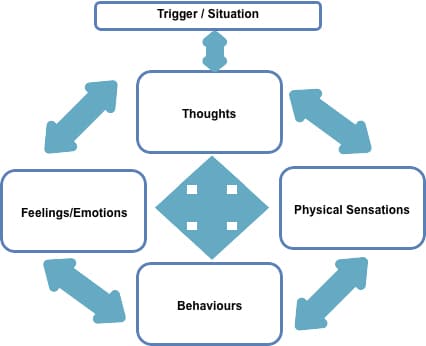CBT can be particularly useful at helping you to make sense of overwhelming problems you may be facing in everyday life by breaking them down into smaller and manageable pieces. This makes it easier to see how they are connected and how they might affect you.
These segments are:
- Situation – a problem, event or difficult situation in any aspect of your life
This is often followed by:
- Thoughts (things going through your mind)
- Feelings (the emotions you might be experiencing)
- Physical reactions (the physiological sensations in your body)
- Behaviour (the actions you might/might not follow through)
Each of these different areas often affects the others:
The way in which you think (thoughts) about a problem can affect how your body reacts physiologically (physically) and emotionally (feelings). It can also alter what you do about it (behaviour). A simple way of showing this process is in the diagram below called a hot-cross bun:

